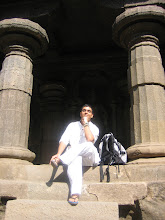“So, first of all, let me assert my firm belief that the only thing we have to fear is fear itself—nameless, unreasoning, unjustified terror which paralyzes needed efforts to convert retreat into advance.” (1)The man was the newly elected U.S. President, Franklin D. Roosevelt, and the speech was his Inaugural address to a country in the midst of the Great Depression. All of us know what fear is. Perhaps we can’t provide a dictionary definition (2) but we all know what it is because we’ve all experienced it in its various forms. We also know that fear can drive people to things that they would never do under normal circumstances. So much suffering, great and small, has arisen from fear but how can we begin to understand it? One way is to look at what it means to be free from fear, or abhaya.
Abhaya (pronounced “uh-bhuh-yuh”) is a Pali/Sanskrit word meaning “fearless, free from danger, safe, secure, undaunted” (3). It is composed of two parts; ‘bhaya’ meaning “fear, fright, or dread” (4) and the prefix ‘a’ which denotes ‘not, or non’.
Fear can be very powerful. It can be so powerful that it paralyzes us, as FDR says. Because of fear’s potential to paralyze in so many ways; physical, emotional, and spiritual, the Buddha taught many different ways of overcoming it. In the Dhajjaga Sutta (The Top of the Standard Sutta), the Buddha gives advice to his followers on how to overcome fear when they are practicing alone in the wilderness. Imagine what it must’ve been like to try and meditate alone when there are tigers, wild elephants, cobras, bandits, and many other fear-inspiring things roaming around. In this case, the Buddha recommended the practice of Recollecting (5) the Three Jewels (the Buddha, Dharma, and Sangha) as a way to allay fear:
“i. Whether in forest or at foot of tree,On another occasion, a group of monks were facing a similar situation; they couldn’t practice because they were being disturbed by spirits that wanted to drive them out of the forest (7). When they told the Buddha of this occurrence, he taught them what would become one of the most well-known suttas ever: the Metta Sutta. In Pali ‘metta’ means loving-kindness, or benevolence (8). The reason for the Buddha teaching metta to the terrified monks is simple: fear cannot dwell in a heart filled with love. A full discussion of metta is best left for another thread but what we should keep in mind is that metta is not merely a psychological comfort: it has real power and can “rub off” on other beings.
Or in some secluded spot, O monks,
Do call to mind that Buddha Supreme;
Then will there be no fear to you at all.
ii. If you think not of the Buddha, O monks,
That Lord of the world and Chief of men,
Then do think, O monks, of that Dhamma;
So well preached and leading to Nibbana.
iii. If you think not of the Dhamma, O monks
Well preached and leading to Nibbana;
Then do think, O monks, of that Sangha,
That wonderful field of merit to all.
iv. To those recalling the Buddha supreme,
To those recalling the Dhamma sublime,
And to those recalling the Sangha,
No fear, no terror will make them quiver”. (6)
One famous story involving the power of metta has to do with a drunken elephant that tried to attack the Buddha. Acharya Buddharakkhita relates this story in his book “Metta – The Philosophy and Practice of Universal Love”:
“Once the Buddha was returning from his almsround together with his retinue of monks. As they were nearing the prison, in consideration of a handsome bribe from Devadatta, the Buddha's evil and ambitious cousin, the executioner let loose the fierce elephant Nalagiri, which was used for the execution of criminals. As the intoxicated elephant rushed towards the Buddha trumpeting fearfully, the Buddha projected powerful thoughts of metta towards it. Venerable Ananda, the Buddha's attendant, was so deeply concerned about the Buddha's safety that he ran in front of the Buddha to shield him, but the Buddha asked him to stand aside since the projection of love itself was quite sufficient. The impact of the Buddha's metta-radiation was so immediate and overwhelming that by the time the animal neared the Buddha it was completely tamed as though a drunken wretch had suddenly become sober by the magical power of a spell. The tusker, it is said, bowed down in reverence in the way trained elephants do in a circus”. (9)
Another powerful way of overcoming fear is to look deep within ourselves and take a long look at the nature of the fear itself. Noted Tibetan Buddhist scholar, Alexander Berzin says that one way we can do this is to:
“Reaffirm that having Buddha-nature means that we have the basis for all good qualities complete within us. In Western psychological terms, these qualities may be conscious or unconscious (we may be mindful of them or not, and they may be developed to different degrees). Often, we project the unconscious qualities as a "shadow." Because the unconscious is the unknown, the tension of being unaware of it manifests as fear of the unknown and thus fear of our unknown unconscious qualities. Thus, we may identify with our conscious intellectual side and ignore or deny our unknown, unconscious, emotional feeling side. We may project the emotional feeling side as a shadow and be frightened of others who are very emotional. We may be afraid of our own emotional side and have anxiety about being out of touch with our feelings. If we identify with our conscious emotional feeling side and deny our unconscious intellectual side, we may project the intellectual side as a shadow and be intimidated by those who are intellectual. We may be afraid to try to understand anything and feel anxiety about being intellectually dull. Thus, we need to reaffirm both sides as complete within us, as aspects of our Buddha-natures” (10).
As previously mentioned, fear is one of the biggest obstacles we encounter on the spiritual path but what can happen after we move past our fears? According to the Heart Sutra, the answer is liberation. In this sutra, the Bodhisattva Avalokiteshvara (11) describes the liberating insights he has regarding the inherent emptiness (or limitless potential) of various aspects of existence. Towards the end of the Sutra, he says:
“…through prajñāpāramitā bodhisattvas have no obstructions in their minds. Having no obstructions there is no fear and departing from erroneous views and conclusions, they reach ultimate nirvana”(12).Sarvamangalam - सर्वमंगलम्
May all be blessed,
***
(1) “History Matters” – The U.S. Survey Course on the Web, George Mason University:
http://historymatters.gmu.edu/d/5057/
(2) Merriam-Webster’s Dictionary (http://www.merriam-webster.com/) defines fear as, among other things, “an unpleasant often strong emotion caused by anticipation or awareness of danger
(3) Pali Text Society's Pali-English Dictionary Online p. 61. Accessed via the "Digital Dictionaries of South Asia" Project. http://dsal.uchicago.edu/dictionaries
(4) Ibid, p 499
(5) Mindful Recollection is known in Sanskrit as anusmṛti - (Devanāgari: अनुस्मृति ); Pali: Anussati.
(6) Dhajjaga Sutta, Samyutta Nikaya Section 11, Sutta 3, translated by Piyadassi Thera. From Access to Insight: http://www.accesstoinsight.org/tipitaka/sn/sn11/sn11.003.piya.html
(7) Metta-The Philosophy and Practice of Universal Love, by Acharya Buddharakkhita. From Access to Insight:
http://www.accesstoinsight.org/lib/authors/buddharakkhita/wheel365.html#ch1
(8) Ibid.
(9) Ibid
(10) “Handling Fear” by Alexander Berzin. From the Berzin Archives:
http://www.berzinarchives.com/web/en/archives/sutra/level3_lojong_material/general/hand_fear.html
(11) The word ‘Abhaya’ is also a common epithet for Avalokiteshvara, (the Fearless One) as well as for bodhisattvas in general.
(12) Prajñāpāramitā (Devanāgari: प्रज्ञापारमिता) means the “Perfection of Wisdom” in Sanskrit. It is one of the qualities that Bodhisattvas cultivate on their path to Full Awakening. This translation of the Heart Sutra is from the Bodhi Monastery Liturgy:
http://www.bodhimonastery.net/bm/








No comments:
Post a Comment